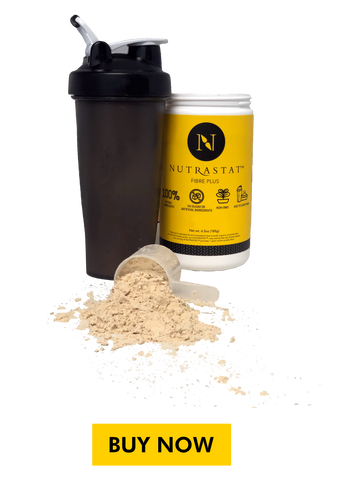We’ve all heard of probiotics, the good bacteria we can get from foods that help us keep enough healthy bacteria in our gut. Did you know that there is also a type of fiber known as prebiotics that are just as important?
Prebiotics are the food that our gut bacteria need to survive. They go hand in hand with probiotics, however we often don’t realize how critical they are to our overall health. In this article we’ll explore what prebiotics are, why they play such a critical role in our health and wellbeing, and how we can add more of them to our diet to live better, happier lives.

Prebiotics vs Probiotics – What's The Difference?
The millions of tiny bacteria in our gut are essential for overall health and wellbeing. These healthy bacteria, technically called microbiota, form a small ecosystem in your digestive system called a microbiome. Your gut bacteria help to metabolize food, medications, and protects your intestines from disease and infection. Certain studies have shown that certain microbiota may be the key to preventing and/or treating diseases such as heart disease, cancer, and rheumatoid arthritis.
Each of our microbiomes are unique and are composed of approximately 1000 bacterial species. While we get most of our original bacteria from our parents, you can add healthy bacteria to your gut by consuming probiotics. Probiotics are foods that contain strains of living bacteria. Foods rich in probiotics include:

So, where do the prebiotics come in? Simple, prebiotics are essentially the food that your microbiota need to thrive!
Prebiotics are specialized plant fibers that allow your gut microbiota to survive and thrive. Without prebiotics, you would slowly lose your gut bacteria and your overall health would degrade.
Prebiotics can be found in a variety of foods such as:

*Notably the beta-glucan in barley, which is the active ingredient of NutraStat, has been linked to numerous prebiotic benefits.

The benefits of healthy gut bacteria
Keeping your microbiome healthy is essential for your overall health and wellbeing because it supports:- Your digestion (certain types of gut bacteria aid the digestion and energy extrapolation from complex carbohydrates and proteins)
- Your immune system (some gut bacteria can protect from pathogens being allowed to colonize in your digestive system)
- Your bone health (certain bacteria help to digest calcium, which is essential for the development of bones)
- Your brain (studies are beginning to show indications between having a healthy microbiome and improved mood/decreased depression, this is because the gut and brain communicate through something called our gut-brain axis which connects our digestive system to our central nervous system)
- Your weight (some studies have linked having a balanced microbiome to being of healthy weight and obesity to unbalanced microbiomes)
How to Get More Prebiotics
While you likely enjoy foods that contain prebiotic foods on occasion, the best way to ensure you are eating enough prebiotics is to add a fiber supplement to your diet.
Dietary fiber supplements such as NutraStat contain beta-glucan fiber which has been linked with numerous prebiotic benefits and assist with improving your overall gut health and digestive system maintenance. NutraStat is a fiber supplement extracted from barley grains that has a high concentration of beta-glucans.

A last word
Supporting and maintaining proper gut health is one of the easiest ways to improve your overall wellbeing. By simply ensuring you are eating enough prebiotics and probiotics, you can enjoy a healthier life.
-
Sources and Studies:
- https://www.ncbi.nlm.nih.gov/pmc/articles/PMC3958897/
- https://www.sciencedirect.com/science/article/abs/pii/S0963996910000384
- https://pubmed.ncbi.nlm.nih.gov/26386056/
- https://www.mayoclinic.org/prebiotics-probiotics-and-your-health/art-20390058
- https://www.health.harvard.edu/staying-healthy/can-gut-bacteria-improve-your-health#:~:text=Your%20gut%20microbiota%20plays%20many,microbiota%20may%20do%20much%20more.
- https://www.healthline.com/nutrition/11-super-healthy-probiotic-foods#TOC_TITLE_HDR_9
- https://www.healthline.com/nutrition/19-best-prebiotic-foods#TOC_TITLE_HDR_6
- https://enzymedica.com/blogs/be-well/5-surprising-benefits-of-a-healthy-microbiome
- https://www.healthline.com/health-news/probiotics-and-prebiotics-may-help-ease-depression#More-research-needed






